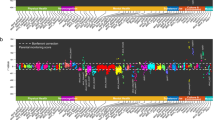Abstract
Consistent with the results of previous studies of children with depressed parents, the present investigation of social-cognitive abilities with schizophrenic parents yields no evidence of deleterious effects of parental psychopathology. Similarly, maltreatment was not associated with social-cognitive deficits. The central conclusion to be drawn from these results is that social-cognition does not mediate the effects of these risk factors on child behavior, although social-cognition may serve as a moderator.
Similar content being viewed by others
References
Cantor N, Kihlstrom J:Personality and Social Intelligence. New York: Prentice Hall, 1987.
Kendall P: Comments on Rubin and Krasnor. Solutions and problems in research problem solving. In M. Perlmutter (Ed.)Cognitive Perspective on Children's Social and Behavioral Development. Hillsdale, New Jersey, Erlbaum, 1986.
Rubin K, Krasnor L: Social-cognitive and social behavioral perspectives on problem solving. In M. Perlmutter (Ed)The Minnesota Symposium on Child Psychology. Hillsdale, New Jersey, Erlbaum, 1986.
Kendall P, Fischler G: Behavioral and adjustment correlates of problem solving: Validation analyses of interpersonal cognitive problem-solving measures.Child Dev 55:879–892, 1984.
Beardslee W, Schultz L, Selman R: Level of social cognitive development, adaptive functioning and DSM III diagnoses in adolescent offspring of parents with affective disorders: Implications for the development of capability for mutuality.Dev. Psy 23:807–815, 1987.
Pelligrini D, Kosiski S, Nachman D, Cytryn L, McKnew D, Gershon E, Hamovit J, Cammuso K: Personal and social resources in children of patients with bipolar affective disorders and children of normal subjects.Am J of Psychiat 143:856–861, 1986.
Barahal R, Waterman J, Martin H; The social-cognitive development of abused children.J Consult and Clinic Psy 49:508–516, 1981.
Weintraub S: Risk factors in schizophrenia.Psy Bull 13:439–450, 1987.
Wynne L, Cole R, Perkins P: The University of Rochester Child and Family Study.Schizophr Bull 13:463–476, 1987.
Cicchetti D, Rizley R: Developmental perspectives on the etiology, intergenerational transmission and sequelae of child maltreatment. In R. Rizley & D. Cicchetti (Eds.),New directions for child development, 11:31–55. San Francisco, Jossey Bass, 1981.
Friedlich W, Einbender A: The abused child: A psychological review.J Clinic Child Psy 12:244–256, 1983.
George C, Main M: Social interactions of young abused children: Approach, avoidance, and aggression.Child Dev 50:306–318, 1979.
Izard C:The Face of Emotion. New York, Appleton, 1971.
Fields, S.: Discrimination of facial expression and its relationship to personal adjustment.Am Psy 5:309, 1950.
Forsyth, G.: Cue utilization in judging facial expression related to school performance.J Soc Psy 104:253–261, 1978.
Rosenthal R, Hall J, DiMattea M, Rogers P, Archer D:Sensitivity to Nonverbal Communication. Baltimore, Johns Hopkins Press, 1979.
Spivack G, Platt J, Shure M:The Problem Solving Approach to Adjustment. San Francisco, Jossey-Bass, 1976.
Neale J, Winters K, Weintraub S: Information processing deficits in children at high-risk for schizophrenia. In N. Watt, E.J. Anthony, L. Wynne & J. Rolf (Eds.)Children at Risk for Schizophrenia: A Longitudinal Perspective (pp.264–278) New York, Cambridge, 1984.
Pettit G, Dodge K, Brown M: Early family experience, social problem solving patterns and children's social competence.Child Dev 59:107–120, 1988.
Herrenkohl R, Herrenkohl E: Some antecedents and developmental consequences of child maltreatment. In R. Rizley & D. Cicchetti (Eds.),New Directions for Child Development 11:57–76, 1981.
Jaffe P, Wolfe D, Wilson S, Zak L: Similarities in behavioral and social adjustment among child victims and witnesses to family violence.Am J Orthopsychiat 56:142–146, 1986.
Watt N, Wynne L, Anthony E, Rolf J:Children at risk for schizophrenia: A Longitudinal Perspective. New York, Cambridge, 1984.
Beardslee W, Bemporad J, Keller M, Klerman G: Children of parents with major affective disorder: A review.Am J Psychiat 160:825–832, 1983.
West M, Prinz R: Parental alcoholism and childhood psychopathology.Psy Bull 102:204–218, 1987.
McGlashan T: Testing four diagnostic systems for schizophrenia.Arch Gen Psychiat 41:141–144, 1984.
Pelton L: Child abuse and neglect: The myth of classlessness.Am. J Orthopsychiat 48:608–617, 1978.
Marsh D, Serafica F, Barenhoim C: Effects of perspective taking training on interpersonal problem solving.Child Dev 50:140–145, 1980.
Shure M, Spinack G: Means-ends thinking, adjustment and problem solving in school-aged children.J Consult and Clinic Psy 38:348–353, 1972.
D'Zurilla T, Goldfried M: Problem solving and behavior modification.J of Abnormal Psy 78:107–126, 1971.
Dodge K: A social information processing model of social competence in children. In M. Perlmutter (Ed)The Minnesota Symposia on Child Psychology. Hillsdale, New Jersey, Erlbaum, 1986.
Dodge K, Frame C: Social-cognitive biases and deficits in aggressive boys.Child Dev 53:620–635, 1982.
Dodge K, Pettit G, McClaskey C, Brown M: Social competence in children.Monographs of the Society for Research in Child Development 51:2, 1986.
Dolgin, K: Needed steps for social competence: Strengths and present limitations of Dodge's model.The Minnesota Symposia on Child Psychology. Hillsdale, New Jersey, Erlbaum, 1986.
Walker E, Cudeck R, Mednick S, Schulsinger F: The effects of parental absence and institutionalization on the development of clinical symptoms in high-risk children.Acta Psychiatrica Scandinavica 63:95–109, 1981.
Author information
Authors and Affiliations
Additional information
This research was supported by a grant to the first author from the W. T. Grant Foundation.
Rights and permissions
About this article
Cite this article
Walker, E.F., Downey, G. The effects of familial risk factors on social-cognitive abilities in children. Child Psych Hum Dev 20, 253–267 (1990). https://doi.org/10.1007/BF00706018
Received:
Revised:
Accepted:
Issue Date:
DOI: https://doi.org/10.1007/BF00706018




